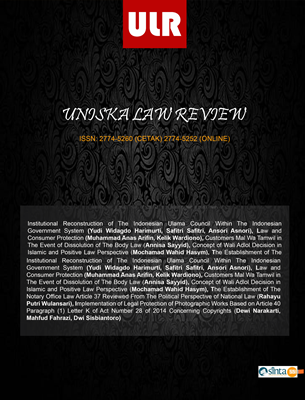The Legal Protection for Children Outside Registered Marriage
Main Article Content
Abstract
This research is motivated by the social reality in Indonesia, where many children are born from unregistered marriages and consequently face legal discrimination in exercising their civil rights. The aim of this study is to analyze the provisions of Indonesia’s positive law regarding the status and protection of the rights of children born out of unregistered marriages, as well as to examine the legal implications of the Constitutional Court Decision Number 46/PUU-VIII/2010 in ensuring equal legal protection for children born out of wedlock. The method used is normative legal research with statutory and conceptual approaches. Data were collected through literature studies and analyzed descriptively and qualitatively to produce a comprehensive legal argument. The results show that Indonesia’s positive law regulates the civil status and rights of children born out of wedlock through various regulations, from the Civil Code to the Marriage Law. Initially, such children only had civil relations with their mother and the maternal family. The Civil Code differentiates between legitimate, illegitimate, and adulterine children, influencing inheritance rights. The Marriage Law affirms that only registered marriages are legally recognized, which causes children from unregistered marriages to be classified as born out of wedlock. However, Constitutional Court Decision No. 46/PUU-VIII/2010 broadened the rights of illegitimate children by allowing civil relationships with their biological father based on scientific evidence. This grants access to inheritance rights and legal identity. The principles of non-discrimination and child protection are also emphasized in the 1945 Constitution and the Child Protection Law. The state is obligated to guarantee justice for all children regardless of their birth status and to ensure the effective and equal implementation of these rights.
Article Details
How to Cite
AFDA'U, Faisal.
The Legal Protection for Children Outside Registered Marriage.
UNISKA LAW REVIEW, [S.l.], v. 5, n. 2, p. 154 - 172, june 2025.
ISSN 2774-5252.
Available at: <https://ejournal.uniska-kediri.ac.id/index.php/SJ/article/view/6971>. Date accessed: 05 mar. 2026.
doi: https://doi.org/10.32503/ulr.v5i2.6971.
Section
Articles
References
A. Mukti Arto. Praktek Peradilan Agama di Indonesia. Pustaka Pelajar, Yogyakarta, 2001.
Abdul Wahid dan Muhammad Irfan. Perlindungan Terhadap Anak dalam Hukum Indonesia. Refika Aditama, Bandung, 2010.
Ahmad Rofiq. Hukum Islam di Indonesia. RajaGrafindo Persada, Jakarta, 2013.
Ali Afandi. Hukum Keluarga Islam di Indonesia. Prenadamedia Group, Jakarta, 2018.
Komarudin Hidayat. Psikologi Perkawinan dan Anak dalam Perspektif Islam. Paramadina, Jakarta, 2005.
Mahkamah Konstitusi Republik Indonesia. Putusan Mahkamah Konstitusi Nomor 46/PUU-VIII/2010 tentang Pengujian Pasal 43 Ayat (1) UU Perkawinan. Mahkamah Konstitusi, Jakarta, 2010.
Maria Farida Indrati. Ilmu Perundang-undangan: Jenis, Fungsi, dan Materi Muatan. Kanisius, Yogyakarta, 2007.
Muhammad Jazil Rifqi. Perlindungan Hukum terhadap Anak dalam Nikah Siri. Pustaka Pelajar, Yogyakarta, 2016.
Muhammad Jazil Rifqi. Perlindungan Hukum terhadap Anak dalam Nikah Siri. Al-Qānūn: Jurnal Pemikiran dan Pembaharuan Hukum Islam, Vol. 23, No. 2, Desember 2020
Neng Djubaedah. Perlindungan Hukum terhadap Anak di Indonesia. Mandar Maju, Bandung, 2012.
Republik Indonesia. Undang-Undang Nomor 1 Tahun 1974 tentang Perkawinan. Kementerian Hukum dan HAM, Jakarta, 1974.
Siti Musdah Mulia. Islam dan Hak-Hak Reproduksi Perempuan. LKiS, Yogyakarta, 2002.
Siti Zahro. Perkawinan dalam Perspektif Hukum Islam dan Undang-Undang Perkawinan. Kencana, Jakarta, 2014.
Soetandyo Wignjosoebroto. Hukum: Paradigma, Metode, dan Dinamika Masalahnya. Elsam, Jakarta, 2002.
Abdul Wahid dan Muhammad Irfan. Perlindungan Terhadap Anak dalam Hukum Indonesia. Refika Aditama, Bandung, 2010.
Ahmad Rofiq. Hukum Islam di Indonesia. RajaGrafindo Persada, Jakarta, 2013.
Ali Afandi. Hukum Keluarga Islam di Indonesia. Prenadamedia Group, Jakarta, 2018.
Komarudin Hidayat. Psikologi Perkawinan dan Anak dalam Perspektif Islam. Paramadina, Jakarta, 2005.
Mahkamah Konstitusi Republik Indonesia. Putusan Mahkamah Konstitusi Nomor 46/PUU-VIII/2010 tentang Pengujian Pasal 43 Ayat (1) UU Perkawinan. Mahkamah Konstitusi, Jakarta, 2010.
Maria Farida Indrati. Ilmu Perundang-undangan: Jenis, Fungsi, dan Materi Muatan. Kanisius, Yogyakarta, 2007.
Muhammad Jazil Rifqi. Perlindungan Hukum terhadap Anak dalam Nikah Siri. Pustaka Pelajar, Yogyakarta, 2016.
Muhammad Jazil Rifqi. Perlindungan Hukum terhadap Anak dalam Nikah Siri. Al-Qānūn: Jurnal Pemikiran dan Pembaharuan Hukum Islam, Vol. 23, No. 2, Desember 2020
Neng Djubaedah. Perlindungan Hukum terhadap Anak di Indonesia. Mandar Maju, Bandung, 2012.
Republik Indonesia. Undang-Undang Nomor 1 Tahun 1974 tentang Perkawinan. Kementerian Hukum dan HAM, Jakarta, 1974.
Siti Musdah Mulia. Islam dan Hak-Hak Reproduksi Perempuan. LKiS, Yogyakarta, 2002.
Siti Zahro. Perkawinan dalam Perspektif Hukum Islam dan Undang-Undang Perkawinan. Kencana, Jakarta, 2014.
Soetandyo Wignjosoebroto. Hukum: Paradigma, Metode, dan Dinamika Masalahnya. Elsam, Jakarta, 2002.
